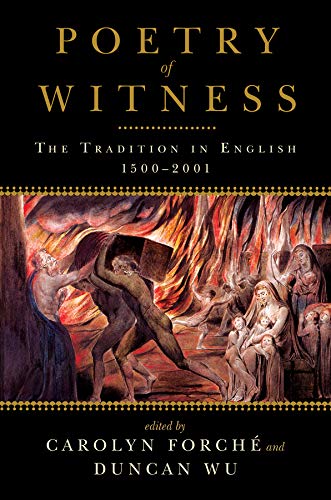


Full description not available
V**S
500 Years of Poetry Made Fresh, New
A poem of witness, as Carolyn Forché has written here and elsewhere, is not a poem about a calamitous event; not a poem written about the body-and-soul-wrenching experience of war, or torture, or persecution, or disease. It is a poem written in the aftermath. So, then, the poem arises from the experience and is not simply journalistic reportage or political discourse.“Aftermath is a temporal debris field,” Forché writes in her introductory essay (“Reading the Living Archives: The Witness of Literary Art”), “where historical remains are strewn (of large events as well as those peripheral or lost); where that-which-happened remains present, including the consciousness in which such events arose. . .As such, it calls upon the reader, who is the other of this work, to be, in turn marked by what such language makes present before her, what it holds open and begets in the reader.”Forché and her editorial collaborator, Duncan Wu, have gathered together in this volume 500 years of poetry in English written in this aftermath. These are poems with which the reader is very likely familiar or knows quite well, but now, within this context of witness, can be read afresh and anew, with greater appreciation, perhaps, for the human consciousness that experienced these events and wrote in their aftermath.From More and Wyatt to Shelley and Keats; from Whitman, Melville, and Dickinson to Yeats, Kipling and Crane; Shapiro and Stafford to Snodgrass and Gunn — this is a grand and sweeping volume that bears witness to our shared human condition.
O**T
Great source for Reference purposes as well as Good Poetry
An eclectic & comprehensive work.
G**R
Essential Reading for All Who Seek to Understand The Human Experience
Carolyn Forche has compiled a collection of poems which, in their devastating honesty, offer hope for the human race. Perhaps by acknowledging our own capacity for evil, we can move beyond it in the future. An essential book for all who care!
M**T
great addition to Against Forgetting
Forche has done us another great service. Great selections with amazing accompanying insights. An honor to have it on the shelf next to her earlier "Against Forgetting." Powerful.
M**L
Wonderful compilation
Wonderful compilation with concise biographies of the poets and the conditions which gave rise to the poems. Kudos to Forchet.
R**N
We are very fortunate to have this second edited volume of verse
Forché is superb in all that she undertakes as a poet and scholar. We are very fortunate to have this second edited volume of verse, one which offers the reader the Poetry of Witness from those poets writing in English.
R**R
Five Stars
Good collection
S**E
Absolutely Essential Poetry
On January 22, I received an electronic review copy of Poetry of Witness from W.W. Norton. Like all of the Norton anthologies this book is huge, so I haven’t begun to work my way completely through it, but I am already at a point where I feel that, even if I used every superlative in my writer’s armamentarium, I wouldn’t be doing this collection justice.Poetry of Witness, which Forché also calls literature of that-which-happened, has a long history, though I find it less often than I’d like in English-language poetry, which seems more preoccupied with relating the complexity of individual emotion—whether joyful of mournful. Forché’s forward, “Reading the Living Archives: The Witness of Literary Lives,” attempts to forge a definition of poetry of witness that captures its meaning for author, reader, and society alike, concludingIn the poetry of witness, the poems make present to us the experience, rather than a symbolic representation. When we read the poem as witness, we are marked by it and become ourselves witnesses to what it has made present before us. Language incises the page, wounding it with testimonial presence, and the reader is marked by encounter with that presence. Witness begets witness. The text we read becomes a living archive.Forché reminds us that this living archive is not just figurative, but literal: Anna Akhmatova burned many of her poems after friends had memorized them, keeping them present when their physical presence would have been a very real threat to her life.Poetry of witness emerges from, not after, experience, since it testifies to experiences that cannot be left behind, cannot become after. Forché argues that the language of poetry of witness is a damaged—and therefore transformed—language. The body of thought, like the body itself can be broken, (partially) rebuilt, mended:The witness who writes out of extremity writes his or her wound, as if such writing were making an incision. Consciousness itself is cut open. At the site of the wound, language breaks, becomes tentative, interrogational, kaleidoscopic. The form of this language bears the trance of extremity, and may be composed of fragments: questions, aphorisms, broken passages of lyric prose or poetry, quotations, dialogue, brief and lucid passages that may or may not resemble what previously had been written.This volume, which is arranged chronologically, is a companion to Forché’s 1993 anthology, Against Forgetting (also published by Norton), which focuses on 20th Century poetry of witness. Poetry of Witness, with its broader focus, offers a powerful lineage of refusal, of questioning, on individuals destroyed upon the altars of states. These poems are part of the flow of literary witness across the last five hundred years of our history: long, damaged, glistening strands, like ropes, like rivers, like the twist of dna. By testifying to the worst in us, they preserve not only horror, but the hope of something better.I don’t have now, and don’t know if I ever will have, words to capture the fierce, essential nature of this collection. I do know I will read and reread it—and, I hope, use it as a spur to thought, word, and action.
A**R
A fantastic anthology.
Great poems. Very interesting introductions.
Trustpilot
1 month ago
1 month ago